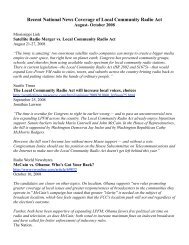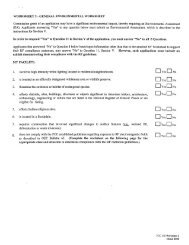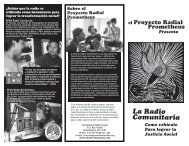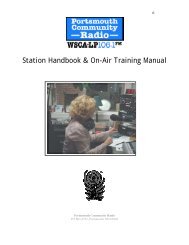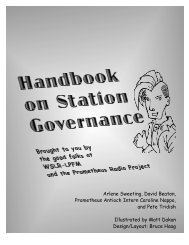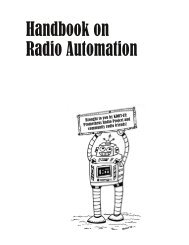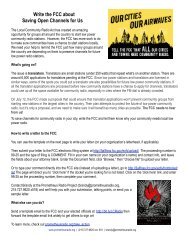first study - Prometheus Radio Project
first study - Prometheus Radio Project
first study - Prometheus Radio Project
Create successful ePaper yourself
Turn your PDF publications into a flip-book with our unique Google optimized e-Paper software.
The Cap May Result in Lack of Local Service in Rural Areas<br />
As shown above and in the <strong>study</strong> data within the Appendices, the ten application cap<br />
does not achieve a balance of LPFM and translator service. Furthermore, it also could<br />
end up hampering potential rural service by translators. All Auction No. 83 applicants,<br />
when picking their ten translators to protect under the ten cap approach, are more likely<br />
to pick the best channels in urban, not rural areas. The largest of filers would<br />
understandably dump all their rural service applications and attempt to pursue the larger<br />
population coverage channels. For example, approximately 70% of <strong>Radio</strong> Assist’s<br />
pending applications are in non-top 150 markets. When forced to choose ten, the rural<br />
applications likely would be discarded in favor of urban translators. Across all translator<br />
applicants, prospective rural service would suffer.<br />
The FCC has noted in prior orders that the purpose of a translator is to be a “station<br />
[that] provides a service to the public which it would not otherwise receive” 18 —and<br />
additionally, to “allow FM stations to provide supplementary service to areas in which<br />
direct reception of radio service is unsatisfactory due to distance or intervening terrain<br />
barriers (e.g., a mountain).” 19 Ironically, and contrary to the spirit of the translator<br />
service, licensees of rural full power stations are now competing for urban translator<br />
channels to extend the reach of their own services that may already be available in the<br />
city. The result in many scenarios is that the ten application cap could indeed be the<br />
reverse of what the FCC intended for translators. Regardless, FCC precedent makes<br />
clear the importance of translators for balancing service needs in specific areas.<br />
Whether it is providing a service to the public “which it would not otherwise receive”, 20 or<br />
accommodating with waivers those who provide relay service to white areas, 21 both<br />
traditional uses of translators comply with the letter and the spirit of 47 USC Section<br />
307(b). On the other hand, the likely results under the proposed ten application cap<br />
18 Amendment of Part 74 of the Commission's Rules and Regulations to Permit the Operation of<br />
Low Power FM Broadcast Translator and Booster Stations, 20 RR 2d 1538.<br />
19 From “FM Translator and Booster Stations”, FCC website:<br />
http://www.fcc.gov/mb/audio/translator.html<br />
20 Supra see footnote 18.<br />
21 See para. 69 of Report and Order of Amendment of Part 74 of the FM Commission’s Rules<br />
Concerning Translator Stations (MM Docket No. 88-140).<br />
13



